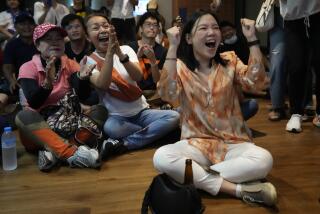End to Bangkok street clashes remains elusive as negotiations fail
- Share via
Reporting from Bangkok, Thailand, and New Delhi — Hopes rose Tuesday morning for a negotiated end to pitched street battles in Bangkok that have killed at least 38 and wounded 295 over the last six days, only to fall later in the day as conditions imposed on talks proved a nonstarter.
The turn of events reflected the volatile nature of a conflict that has dragged on for seven weeks, leaving both sides more deeply entrenched.
Tuesday’s offer by the upper house of parliament to mediate between Prime Minister Abhisit Vejjajiva and anti-government protest leaders initially offered promise, as demonstrators remain in a mile-square protest camp in a posh shopping district despite a Monday deadline set by the government to evacuate.
But later in the day, the government repeated its position that any talks were contingent on the 3,000 to 5,000 protesters leaving their encampment, a demand unlikely to fly.
“Talks will happen only after the protest has ended,” said Cabinet minister Satit Wonghnongtaey, quoting Abhisit.
This followed word that protest leader Nattawut Saikuwa and government negotiator Korbsak Sabhavasu discussed possible negotiations late Monday that also foundered.
These follow earlier failed efforts to end the standoff, most notably an offer by the government earlier this month to hold November elections that was rescinded after protest leaders upped the ante.
With a breakthrough elusive, many went back to their routines. Weary demonstrators got their legs massaged as others at Central World shopping mall napped on the edge of a circular fountain in the afternoon sun. Fiery speeches boomed out from the main stage. A woman sold photos of protest leaders.
The protestors, known as “red shirts” and mostly drawn from poor farming and working-class communities, are calling for Abhisit’s immediate resignation, the dissolution of parliament and new elections to replace a government they believe is illegitimate.
“Why would I go home?” said Sakorn Rangkalin, 54, a housewife from Kalasin province, chatting on a bamboo mat with friends. “The cabinet is still not dissolved.”
They say the current administration came to power by manipulating the courts and courting the powerful military in defiance of 2007 election mandate to restore democracy after a military coup.
Arguably convinced that resolving the crisis will take longer than it hoped, the government extended through Friday a two-day Bangkok holiday scheduled to end Tuesday to “give the authorities time to resolve the crisis and make sure innocent civilians and civil servants are safe,” Supachai Jaisamut, a deputy government spokesman, told reporters.
As the crisis drags on, both sides find themselves in something of a bind, analysts said. Red Shirt leaders are battling defections from protesters increasingly concerned about their job, children’s education, health after sleeping on the street and whether a stray army bullet might hit them. The estimated 3,000-plus core demonstrators this week compare with tens of thousands back in May when the standoff began.
The army, meanwhile, faces growing criticism of brutality as footage airs of sharpshooters striking unarmed citizens. “If the siege doesn’t work, the government could end up marching toward the area where the central state is, which will likely be bloody,” said Paul Chambers, senior research fellow at Germany’s Politics Institute.
On Tuesday, the military defended its use of deadly force in proscribed circumstances, saying troops only fired to protect themselves and citizens.
“If they don’t move close to us, there won’t be any losses,” army spokesman Col. Sansern Kaewkamnerd said, even as he accused protesters of holding a child above a barricade as a human shield.
The army also must be worried by unconfirmed reports that well-trained, well-armed paramilitary fighters, versed in explosives and braced for a fight, are supporting the protesters.
And while the military units chosen for this mission are presumably loyal, it’s less sure if other units are that might be called in should violence spread to other parts of the country.
Nor is the army cordon air-tight, raising the prospect that more weapons are seeping in behind the barriers of razor wire, bamboo rods and kerosene-soaked tires surrounding the encampment.
The ragtag group of protester guards manning the barricades has stockpiled rocks, motorcycle helmets, slingshots, tanks of gasoline, bags of fertilizer, tubes and empty bottles to make petrol bombs and home-made rockets.
“We regard Red Shirts as our people too,” said a lieutenant manning an army checkpoint on the periphery of the protest zone, who didn’t give his name because he wasn’t authorized to speak with the media. “We are all the same Thai people who just have different ideologies.”
“None of us here want violence to occur on either side,” he added.
More to Read
Sign up for Essential California
The most important California stories and recommendations in your inbox every morning.
You may occasionally receive promotional content from the Los Angeles Times.












